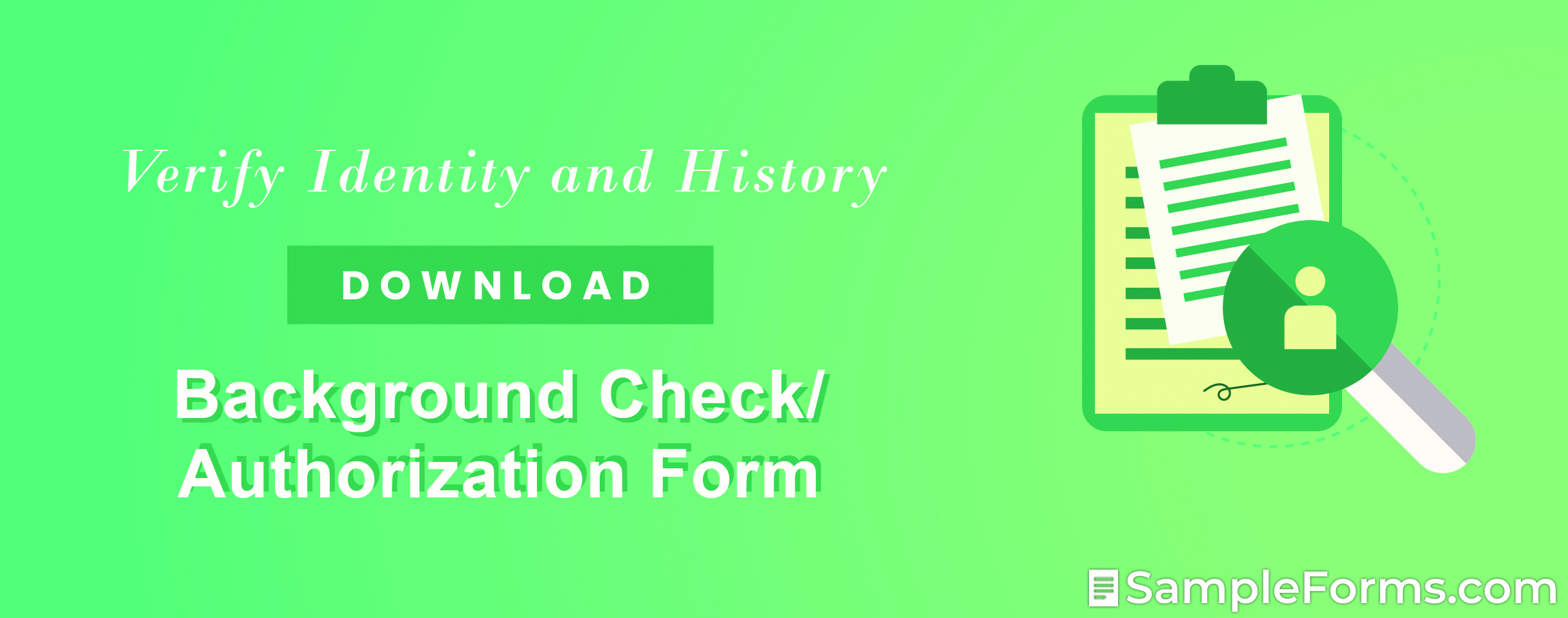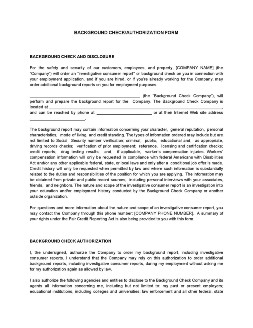- Eviction Notice Forms
- Power of Attorney Forms Forms
- Bill of Sale (Purchase Agreement) Forms
- Lease Agreement Forms
- Rental Application Forms
- Living Will Forms Forms
- Recommendation Letters Forms
- Resignation Letters Forms
- Release of Liability Agreement Forms
- Promissory Note Forms
- LLC Operating Agreement Forms
- Deed of Sale Forms
- Consent Form Forms
- Support Affidavit Forms
- Paternity Affidavit Forms
- Marital Affidavit Forms
- Financial Affidavit Forms
- Residential Affidavit Forms
- Affidavit of Identity Forms
- Affidavit of Title Forms
- Employment Affidavit Forms
- Affidavit of Loss Forms
- Gift Affidavit Forms
- Small Estate Affidavit Forms
- Service Affidavit Forms
- Heirship Affidavit Forms
- Survivorship Affidavit Forms
- Desistance Affidavit Forms
- Discrepancy Affidavit Forms
- Guardianship Affidavit Forms
- Undertaking Affidavit Forms
- General Affidavit Forms
- Affidavit of Death Forms
Background Check/Authorization
People enter into transactions and organizations on different motives. Most in good faith, and sometimes, the other way around. That’s why it’s important to determine the clean ones from the unsavory ones starting with a background check authorization form. Learn why by reading on in this article. Read More
Background Check/Authorization
- What Is a Background Check/Authorization Form?
- How to Complete a Background Check/Authorization Form
- Frequently Asked Questions
- Where are background check authorization forms used for?
- What happens if an applicant refuses to sign the background check authorization form?
- Aside from the FCRA, what are other laws that surround a background check authorization form?
- Who can run a background check after submitting a background check authorization form?
What Is a Background Check/Authorization Form?
A background check authorization form allows us to find out more about the person we are transacting with as permitted by law. This consent form is signed by job and rental applicants in agreement with the requirement of disclosing their background information before a transaction. And like all consent forms, it also needs an applicant’s personal information and their residential addresses for the last 7 years as well. Likewise, the background check authorization form is subsequently submitted to a background company or agency after the applicant signs on it.
How to Complete a Background Check/Authorization Form
Checking on people’s identity and history is necessary for protecting our business before transacting with them. But since it may violate their privacy in the process, it’s important to do so within the bounds permitted by law. To do that, a background check authorization must be signed by an applicant first before we can check their background. And listed on the steps below are tips on how to complete such a process.
1. Stress the Necessity of a Background Check
First off, since we need the person’s consent before checking on their background, it’s very important to explain and stress the necessity of such a process. To do that, give them a quick run-through of the background check authorization form, and explain the necessity of protecting your business as well. This way it will be easy for the applicant to agree and sign on the consent form itself.
2. Gather the Applicant’s Personal InformationThen
Then, after making the applicant agree on having their background checked, the next thing to do is to gather their personal information. Additionally, this also means filling out the consent form itself. To do so, you can either have the applicant write their name, date of birth, and their residential addresses for the last 7 years. Aside from that, they must also include their SSN and driver’s license number as well.
3. Include the Summaries of the Laws that Govern It
Since a background check authorization form allows us to legally check an applicant’s identity and history without violating their privacy, we must also include the laws and statutes that govern it. These laws are the FCRA and individual state laws regarding the release and disclosure of criminal records and civil codes. This will show the applicant that such a background check is lawfully permitted by law, and assure them that any sensitive information about them is safe and secured.
4. Let the Applicant Agree to the Background Check
Next, let the applicant agree to the background check by letting them sign on the consent form. They can fix their signatures on the space provided in the consent form. Besides that, they must also indicate when they signed it as well. After signing from, you must also then do a quick run-through or recap about the background check to the applicant.
5. Submit the Consent Form to the Background Check Company
After the applicant completes the background check authorization form, it’s time to submit it to the company that you hired to investigate on their backgrounds. What they’ll do is that they will comb through every piece of information about the applicant and compile it into a report. Once done, you can then review the report and decide whether to approve or deny their application.
Frequently Asked Questions
Where are background check authorization forms used for?
Background check authorization forms are documents that obtain an applicant’s consent to have their background checked on behalf of the landlord or employer. With that being said, these forms are commonly used in tenancy applications for residential and commercial leases, and job applications in companies. This is so that employers and landlords alike can determine whether an applicant can harm their businesses or not.
What happens if an applicant refuses to sign the background check authorization form?
Complications between you and the applicant may arise if they refuse to sign the authorization form and to give their consent. This means that you can’t have a background check performed on them. On the other end, this will also mean throwing off their application out of the window.
Aside from the FCRA, what are other laws that surround a background check authorization form?
Aside from the FCRA, laws such as the Americans with Disabilities Act and those of governing the disclosure of criminal records also surround background checks and authorization. Aside from that, state laws about information disclosure also play a major part as well. These laws provide a legal backbone to a process that might violate one’s privacy.
Who can run a background check after submitting a background check authorization form?
Normally, background checks are performed by companies that request vital and sensitive information from government agencies on your behalf. These companies will also vary according to your purpose of performing the background check. Some companies may specialize in criminal background investigations, credit, tenancy, and employment histories, or on all of these.
Background checks are our business’s first line of defense. However, there are proper ways of checking a person’s identity and history without breaching their privacy in any way. You can do so by requiring them to sign and agree on a background check authorization form. And whether you’re bringing in new people in your business or accepting a new tenant, remember that safety and security rest on knowing people first.

